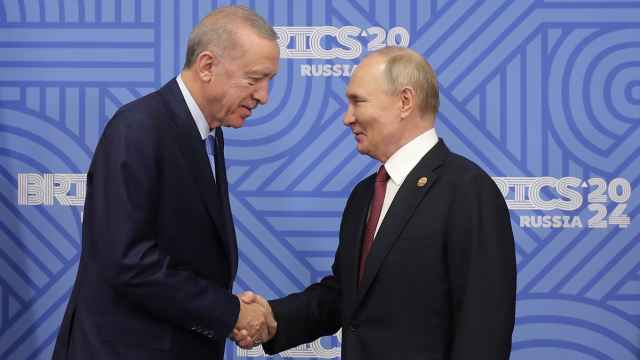Last weekend’s scandal over a Federal Security Service official calling for a ban on Skype, Gmail and Hotmail speaks volumes about the mind-set of those who decide the lives of regular Russians.
Alexander Andreyechkin, head of the FSB’s department for protection of information and special communication, said Friday that the use of these foreign-based Internet services could be a major threat to national security. In effect, the FSB is saying Russians should not use these services because the intelligence agency cannot trace the messages that travel through them. (Skype, Gmail and Hotmail do not share encryption codes with the FSB.)
The significance of this statement cannot be overestimated. After all, Andreyechkin is not a random FSB officer, and whatever he says is certainly a reflection of the agency’s attitude, if not position, on this matter.
This was confirmed by Prime Minister Vladimir Putin’s spokesman Dmitry Peskov, who said Friday that Andreyechkin was voicing the FSB’s official position.
What was surprising was the lame Kremlin reaction. It was left to an unidentified official in the presidential administration to tell RIA-Novosti that Andreyechkin had only voiced his personal opinion. This does not amount to an official reaction or affirmation of the state policy on the use of these services by millions of Russians. Ironically, many press releases that the presidential administration distributes among the media come from Gmail addresses.
President Dmitry Medvedev, who positions himself as an Internet-savvy leader, has said repeatedly that he does not plan to restrict Internet use in Russia.
Andreyechkin’s comments were a blatant contradiction to this message.
Giving up civil freedoms, including the freedom of using Internet services without having security officials peeking over your shoulder, and the presumption of innocence for the sake of national security is nothing new in Russia and elsewhere. Just look at the U.S. Patriot Act, which curtails many freedoms in the name of fighting the war on terror.
The difference in Russia, however, is that these limitations are rarely criticized or debated in the State Duma, and even when they are they are easily overridden by the Kremlin-friendly United Russia party, which controls 70 percent of the seats in the Duma. Lawmakers’ indifference was clearly seen when bills were adopted to expand FSB powers at the expense of citizens’ freedoms in the past.
Moreover, such measures are being implemented by officials whose effectiveness, professionalism and self-serving motives are highly questionable. Needless to say, in a conflict between an individual and the FSB regarding the illegal monitoring of his or her communications, it would be next to impossible to get proper recourse in Russian courts.
The initiative to put certain Internet services under government control — or ban them entirely — might have been a publicity stunt to give Medvedev an opportunity to step in as a champion of free speech. These ploys have been used in the past — for example, an initiative to charge individual fishermen for the right to fish, raising the retirement age, or introducing a 60-hour work week. In all these cases, Medvedev or Putin stepped in as saviors.
This time, if Medvedev wants to convince Russians that he was serious about Internet freedom, just condemning the FSB’s initiative will not be enough. After all, Medvedev condemned the denial-of-service attacks on LiveJournal last week, but they still continue unabated.
To be taken seriously, the president needs to make bold and clear personnel decisions — including making key dismissals within the security and law enforcement agencies, which are considered Putin’s terrain.
A Message from The Moscow Times:
Dear readers,
We are facing unprecedented challenges. Russia's Prosecutor General's Office has designated The Moscow Times as an "undesirable" organization, criminalizing our work and putting our staff at risk of prosecution. This follows our earlier unjust labeling as a "foreign agent."
These actions are direct attempts to silence independent journalism in Russia. The authorities claim our work "discredits the decisions of the Russian leadership." We see things differently: we strive to provide accurate, unbiased reporting on Russia.
We, the journalists of The Moscow Times, refuse to be silenced. But to continue our work, we need your help.
Your support, no matter how small, makes a world of difference. If you can, please support us monthly starting from just $2. It's quick to set up, and every contribution makes a significant impact.
By supporting The Moscow Times, you're defending open, independent journalism in the face of repression. Thank you for standing with us.
Remind me later.






